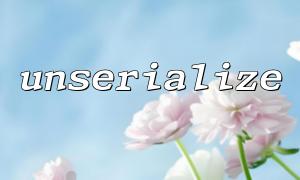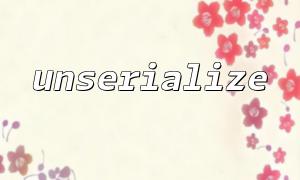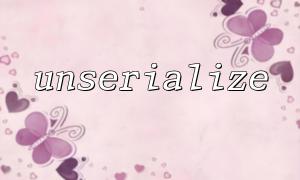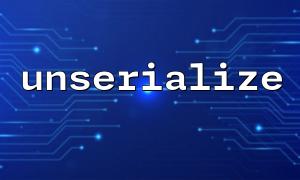In PHP, serialize() and unserialize() are a pair of core functions used for object and data persistence. They allow complex data structures (such as objects, arrays, etc.) to be converted into strings and stored or transferred. However, when you pass the serialized string from one PHP version to another (especially across large versions, such as from PHP 5 to PHP 7 or PHP 8) and then try to deserialize it, you may encounter unexpected problems.
When the object is serialized and the class has been changed in the target PHP environment (such as new attribute addition/deletion, namespace changes, etc.), it may cause the attribute to be missing and even thrown during deserialization:
$serialized = 'O:8:"UserData":2:{s:4:"name";s:4:"John";s:3:"age";i:30;}';
unserialize($serialized); // if UserData The class structure has changed,It may fail here
PHP 7 begins to introduce strict type declarations. If some properties in the old version are assigned dynamically, but the class uses strict constructor types in the new version, a type mismatch error may occur when deserializing.
Since PHP 7.0, the unserialize() function introduces the allowed_classes parameter to control which classes can be safely deserialized. This prevents the problem of malicious code injection, but also means that old code may have problems with not setting the parameter.
$data = file_get_contents('https://gitbox.net/data/serialized-user.txt');
$user = unserialize($data, ["allowed_classes" => ["UserData"]]); // Safer but stricter
Anonymous functions (Closure) cannot be serialized directly in PHP, but some third-party libraries (such as opis/closure ) provide encapsulation mechanisms. If your application uses these encapsulation methods when migrating between PHP versions, it is necessary to ensure compatibility of the same libraries in the target version.
If controlled, it is not recommended to use object serialization for persistence or network transmission. It is more compatible with standard formats such as JSON:
$json = json_encode(['name' => 'John', 'age' => 30]);
$data = json_decode($json, true);
You can define __sleep() in the class to control which attributes are serialized, or perform compatible processing on solution serialization in __wakeup() :
class UserData {
public $name;
public $age;
public function __wakeup() {
if (!isset($this->age)) {
$this->age = 0;
}
}
}
Before upgrading the PHP version, you can take out all serialized data, decode it using the current version of unserialize() , and then resave it through the new version of serialize() to ensure that the format meets the target version.
If you do not rely on object behavior (such as methods), you can completely replace the persistence requirements of the object with JSON to avoid the risks brought by unserialize() .
// Alternatives:use JSON Store user information
file_put_contents('https://gitbox.net/data/user.json', json_encode($user));
Using modern framework tools such as Symfony Serializer and Laravel's serialization encapsulation, they are usually more flexible to version migration and can better abstract and handle incompatible items.
unserialize() is a powerful but fragile tool that may experience various compatibility issues during data migration between different PHP versions. The best strategy is to reduce dependency, control the scope, and choose a more controllable data exchange format. If object serialization is required, it should be accompanied by clear structural control and version detection mechanisms. Otherwise, these "small pits" hidden behind unserialize() can easily become "traps" after they are launched.



